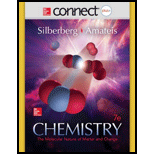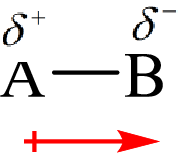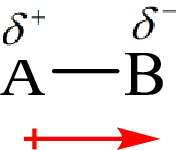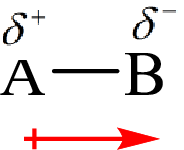
Concept explainers
(a)
Interpretation:
The bond polarity and molecular polarity in dichloromethane
Concept introduction:
The dipole moment arises when there is a separation of charges between two ions or atoms involved in the bond. The dipole moment is a vector quantity and its direction towards the most electronegative atom.
The direction of the dipole moment is represented as follows:

The polar and non-polar molecule can be identified on the basis of the net dipole moment. Polar molecules have non zero value of net dipole moment and the nonpolar molecules have zero net dipole moment.
(b)
Interpretation:
The bond polarity and molecular polarity in iodine oxide pentafluoride
Concept introduction:
Dipole moment arises when there is a separation of charges between two ions or atoms involved in the bond. The dipole moment is a vector quantity and its direction towards the most electronegative atom.
The direction of the dipole moment is represented as follows:

The polar and non-polar molecule can be identified on the basis of the net dipole moment. Polar molecules have non zero value of net dipole moment and the nonpolar molecules have zero net dipole moment.
(c)
Interpretation:
The bond polarity and molecular polarity in iodine pentafluoride
Concept introduction:
Dipole moment arises when there is a separation of charges between two ions or atoms involved in the bond. The dipole moment is a vector quantity and its direction towards the most electronegative atom.
The direction of the dipole moment is represented as follows:

The polar and non-polar molecule can be identified on the basis of the net dipole moment. Polar molecules have non zero value of net dipole moment and the nonpolar molecules have zero net dipole moment.
Want to see the full answer?
Check out a sample textbook solution
Chapter 10 Solutions
Connect 2-Year Access Card for Chemistry: The Molecular Nature of Matter and Change
- Provide the reagents for the following reactions.arrow_forwardIf I have 1-bromopropene, to obtain compound Z, I have to add two compounds A1 and A2. Indicate which compounds are needed. P(C6H5)3arrow_forwardDraw the major product of this reaction. Ignore inorganic byproducts. Assume that the water side product is continuously removed to drive the reaction toward products. O CH3CH2NH2, TSOH Select to Draw >arrow_forward
- Indicate the products obtained by reacting fluorobenzene with a sulfonitric mixture.arrow_forwardIf I have 1-bromopropene, to obtain compound A, I have to add NaOH and another compound. Indicate which compound that would be. C6H5 CH3arrow_forwardIf I have 1-bromopropene and I want to obtain (1,1-dipropoxyethyl)benzene, indicate the compound that I should add in addition to NaOH.arrow_forward
- Draw the major product of this reaction. Ignore inorganic byproducts. Ο HSCH2CH2CH2SH, BF3 Select to Draw I Submitarrow_forwardFeedback (7/10) Draw the major product of this reaction. Ignore inorganic byproducts. Assume that the water side product is continuously removed to drive the reaction toward products. Incorrect, 3 attempts remaining Ο (CH3CH2)2NH, TSOH Select to Draw V N. 87% Retryarrow_forwardIf I want to obtain (1,1-dipropoxyethyl)benzene from 1-bromopropene, indicate the product that I have to add in addition to NaOH.arrow_forward
 ChemistryChemistryISBN:9781305957404Author:Steven S. Zumdahl, Susan A. Zumdahl, Donald J. DeCostePublisher:Cengage Learning
ChemistryChemistryISBN:9781305957404Author:Steven S. Zumdahl, Susan A. Zumdahl, Donald J. DeCostePublisher:Cengage Learning ChemistryChemistryISBN:9781259911156Author:Raymond Chang Dr., Jason Overby ProfessorPublisher:McGraw-Hill Education
ChemistryChemistryISBN:9781259911156Author:Raymond Chang Dr., Jason Overby ProfessorPublisher:McGraw-Hill Education Principles of Instrumental AnalysisChemistryISBN:9781305577213Author:Douglas A. Skoog, F. James Holler, Stanley R. CrouchPublisher:Cengage Learning
Principles of Instrumental AnalysisChemistryISBN:9781305577213Author:Douglas A. Skoog, F. James Holler, Stanley R. CrouchPublisher:Cengage Learning Organic ChemistryChemistryISBN:9780078021558Author:Janice Gorzynski Smith Dr.Publisher:McGraw-Hill Education
Organic ChemistryChemistryISBN:9780078021558Author:Janice Gorzynski Smith Dr.Publisher:McGraw-Hill Education Chemistry: Principles and ReactionsChemistryISBN:9781305079373Author:William L. Masterton, Cecile N. HurleyPublisher:Cengage Learning
Chemistry: Principles and ReactionsChemistryISBN:9781305079373Author:William L. Masterton, Cecile N. HurleyPublisher:Cengage Learning Elementary Principles of Chemical Processes, Bind...ChemistryISBN:9781118431221Author:Richard M. Felder, Ronald W. Rousseau, Lisa G. BullardPublisher:WILEY
Elementary Principles of Chemical Processes, Bind...ChemistryISBN:9781118431221Author:Richard M. Felder, Ronald W. Rousseau, Lisa G. BullardPublisher:WILEY





